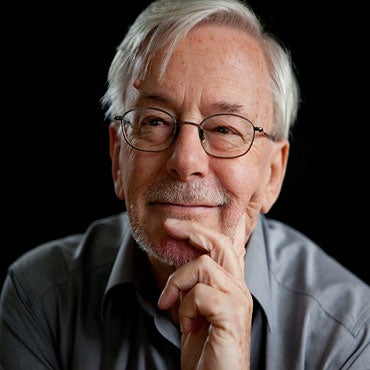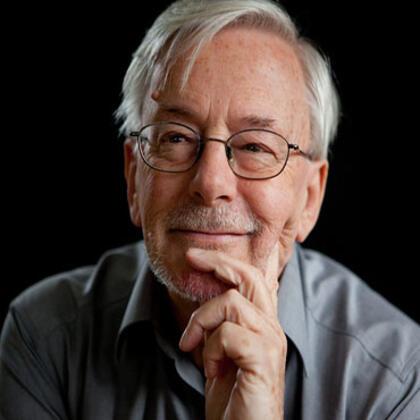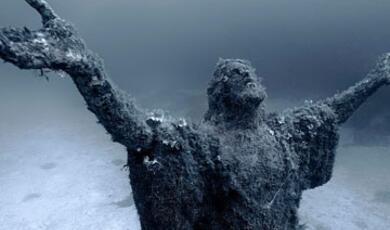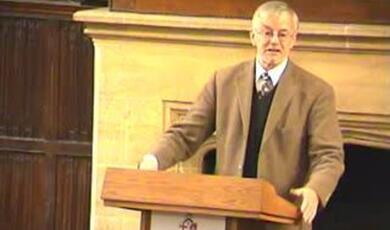The Triumph of Idealism
Share
- Details
- Text
- Audio
- Downloads
- Extra Reading
Religion and Philosophy. There are some misunderstandings which are unthinkingly accepted by most who study Immanuel Kant, the great Idealist and towering figure of Western Philosophy. This lecture is a response to this, and will focus on the three main ideas of Kant's philosophy which effect theology: that Kant undermined and made impossible metaphysics, that he made morality autonomous and separate from beliefs about God or the nature of the world, and that he showed that there could not be any argument for the existence of God.
Download Text
THE TRIUMPH OF IDEALISM
Professor Keith Ward
Immanuel Kant is widely thought of as the philosopher who undermined the possibility of metaphysics, showed that morality is completely independent of religion, and destroyed all rational arguments for God. Yet in fact his aim in philosophy was to set metaphysics on a firm foundation. He suggested that moral obligations would be lacking in all reality, and be unable to motivate our conduct, 'save on the assumption that there exists a supreme being' (Critique of Pure Reason, Dialectic, A. 588). And at the conclusion of his First Critique, he says, 'Can we...assume a wise and omnipotent Author of the world? Undoubtedly we may; and we not only may, but must, do so' (A. 697). That sounds very like an argument for believing in God.
Kant's philosophy is peculiarly complex, but it is completely misunderstood if it is not seen as a defence of belief in one supreme spiritual reality as the ultimate cause of the world. One root of this misunderstanding is a failure to take to heart Kant's distinction between theoretical ('pure') and practical reason.
Kant reports that he had been woken from his dogmatic slumbers by reading David Hume. This did not turn Kant into an Empiricist, but it did bring him to agree with Hume that 'no objects can be represented through pure concepts of understanding, apart from the conditions of sensibility' (A.568). Theoretical knowledge requires both concepts and sense-experiences. Experiences without concepts give no knowledge. But concepts without experiences are 'empty', mere forms of thought without content.
It follows at once that the idea of God has no content, since Kant believed that no sensory experience or direct apprehension of God is possible. Therefore God cannot be an object of theoretical knowledge. But it does not follow that the idea of God is useless, arbitrary, or merely optional. The idea of God is in fact the supreme ideal of Reason, and the fully rational person has to postulate and assume it.
One way of putting this in a more contemporary way is to say that God will never be part of any natural science. God will never be an object studied by chemistry, physics, cosmology, or psychology, and will never be part of any scientific theory. But the idea of God may be a meta-scientific postulate that accounts for the unity and intelligibility of nature, and - even more importantly - for a rational commitment to the pursuit of objective value in morality and aesthetics.
The trouble with such postulates, for Kant, is twofold. They can never be verified, and they often lead to Antinomies, the equal rationality of opposing hypotheses. It was the discovery of the Antinomies, the contradictions, of Reason that led to Kant's Critical philosophy. He thought Reason could prove that time and space are bounded, and that they are infinite; that things are infinitely divisible, and that there must be some smallest indivisible elements (perhaps human selves); that the world is determined, and that the will is free; and that there is a necessary being (God), and that such a being is impossible.
Kant's proposed solution of these polarities is at the heart of his Critical philosophy. It is the doctrine of Transcendental Idealism. All objects of any experience possible to us 'are nothing but appearances' (A491), which have no independent existence outside our thoughts. Even space and time themselves are appearances (or the subjective forms in which appearances occur).
Things in themselves, existing apart from our perceptions, undoubtedly exist. But they are completely unknown to us. Kant says that they may be thought as constituting a 'transcendental object', a purely intelligible reality beyond space and time, that is the cause of appearances. It is transcendental because it is posited as necessary by pure reason, not experience. The transcendental cannot be experienced, and is the unknown condition of what we do experience.
The ideas of finite and infinite time, and of simplicity and infinite divisibility in space, apply only to the world of appearances, since the space-time world simply does not exist 'in-itself'. However the ideas of a non-causally conditioned freedom and of a necessary being could, for all we know, be true of the 'real' world. This Kant calls, significantly, the intelligible or 'noumenal' world - significant, because noumenal means mind-like.
Indeed, Kant holds that reason compels us to think of the intelligible world in a specific way. Human agents, in their thought and moral action, must regard themselves as intelligible objects, as not determined by sensibility but by the free use of reason and understanding. As phenomena, humans are determined, Kant thought, by absolute Newtonian laws of nature. But as noumena, as existing in the world of things-in-themselves, humans must regard themselves as free and morally responsible.
Kant says that he has not established the reality of freedom (A. 558), since realities can only be established by sense-experience. He has not even proved the possibility of freedom, since mere concepts give no theoretical knowledge. Freedom is 'a transcendental idea'. Since there is a transcendental realm, the idea of transcendental freedom does not contradict determinism in the phenomenal realm. The conclusion is that we have no theoretical knowledge that we are free; we cannot prove it theoretically. But reason compels us to assume that we are free, as a condition of moral action and rational thought.
Reason also compels us to posit, in the noumenal realm, a necessary being, which is the unconditioned source of all appearances. In the phenomenal world there is no such necessary being. In the intelligible world we cannot know that there is. But reason leads us to postulate an unconditioned non-empirical reality as the cause of the world of appearances. Reason allows, or even compels, us to make this theoretically 'optional assumption' (A562) of a necessary unconditioned being, that cannot be shown to be impossible.
At this point what Kant thought of as his distinctive contribution to philosophy begins to loom through the fog: 'I have found it necessary to deny knowledge, in order to make room for faith' (Preface to second edition, Bxxxi). Speculative reason must be deprived of all claims to transcendent insight, so that practical commitment to moral and intellectual agency and responsibility are the true bases of regarding the noumenal world as spiritual in nature, as forming a 'Kingdom of Ends', of free moral persons in community, under one sovereign Author of the universe.
So Kant aims 'to deprive metaphysics, once and for all, of its injurious influence', and to silence all objections to morality and religion for ever by the clearest proof. We may find it hard to agree that his proof is very clear. It has been argued over ever since. But it seems that his ultimate appeal is to common-sense, to human dissatisfaction with what is temporal, to human consciousness of duty, and to a human sense of the order, beauty and providence displayed in nature.
It is with this general background in mind that we must approach Kant's treatment of the proofs of God. We can predict that he will think no theoretical proofs are possible. He will also think no disproofs are possible, and will argue that Reason will tell us how we are to think of the noumenal world, if we are to be practically committed to the active pursuit of truth, beauty, and goodness. Arguments for God will be important, as setting out how we must think of God if we are to do justice to our nature as rational and moral agents. But they will not convince all reasonable people, since the ultimate grounds of belief or disbelief lie elsewhere than in pure reason. They will not lead to 'unconditional submission', or lay out their conclusions with 'apodeictic certainty' (A625).
Far from undermining all possible arguments for God, Kant's main aim is to defend arguments for God by putting them on a firm and unshakeable basis for the first time. Some presentations of Kant's philosophy portray him as one who destroyed all reasons for believing in God, but then, as an afterthought, added a patently lame defence of God, freedom, and immortality in order not to shock his manservant Lampe. That is as far from the truth as you can get.
Kant says of what he calls the 'physico-theological proof' that it 'can indeed lead us to the point of admiring the greatness, wisdom, power, etc. of the Author of the world, but can take us no further' (A629). But how much further would we wish to go? Kant finds in the order and intelligibility of nature such a clear indication of the wisdom and intelligence of the unknown cause of nature that 'the belief [in a wise Author of nature] acquires the force of an irresistible conviction' (A624). He finds in our commitment to obeying the categorical commands of duty a sufficient reason for postulating that our existence as moral beings transcends the world of appearances that our senses disclose to us. And he finds in the 'Copernican hypothesis' that appearances must conform to human understanding, a testimony to the fact that that the reasoning self is sovereign over the whole world of sensibility, and gives assurance that noumenal reality is indeed rational and intelligible.
These are Kant's proofs of God, freedom and the transcendence of the self over the world of space and time. They are, he submits, practical rather than theoretical proofs. They are rooted in our practices of seeking intelligible unity and purpose in nature, of moral commitment, and of reasoning and reflection. They give no theoretical knowledge of the noumenal world, since they cannot be verified by sense-experience. They are always qualified by the agnostic consideration that the noumenal world is unknowable. Nevertheless, they disclose how reason commands us to think of that world, even though the way we think is regulative - having its main use in directing our actions in this phenomenal world.
So Kant points out that the physico-theological argument is not deductively inescapable. We could object, as David Hume did, to making analogies between human artefacts and the universe as a whole, or to assuming that the cause of nature must have an understanding and a will analogous to ours. Yet these are natural conjectures, and better than any others we can conceive. They are certainly good reasons for believing in a wise Author of nature, even if not absolutely compelling.
What they do not do, he says, is lead us beyond the idea of an architect or designer of matter to the idea of a creator of matter. They do not lead to the idea of one necessarily existing first cause (or ultimate explanation) of the world. For that we need to add the cosmological argument, from the contingency of the world to the necessity of its ultimate cause.
Kant's main argument here, already outlined in the Antinomies, is that 'necessity' and 'contingency' are concepts that only properly apply to the world of appearances. So they cannot give knowledge of the noumenal world. But we can, and perhaps must, think of the unknown noumenal world as founded on a necessary being, and we must do so, if we are to account for the intelligible origin of the phenomenal (mind-dependent) world in a way that satisfies the demands of reason.
What Kant has in effect done is to bar any claim that Reason has power of itself to prove what noumenal reality is like. But he retains and defends the claim that, if the intelligible world is rational (which we cannot demonstrate), then it must be founded on an ultimate necessity. The rationality of reality is a postulate of reason, and one that has practical utility, especially in commitment to rational reflection and moral responsibility. If reality-in-itself is not as we think it, then it remains the case that we must at least think it like that. And that is a strong reason for trusting such thoughts, which are themselves the product and direct expression of the intelligible world.
So far there is no indication that Kant is destroying all reasons for believing in God. Quite the contrary, he is admitting some reasons to be natural and convincing, on condition that we postulate that reality is rational, and that we do not mix up metaphysical and scientific procedures, and misuse our metaphysical beliefs to try to dictate the results of scientific investigation.
But now comes the section that has misled many people, and caused them to take a more negative view of Kant. He argues that the physico-theological argument depends upon the cosmological, to get from a designer to a necessary creator. Then the cosmological argument depends upon the ontological, to get from an unknown necessary being to the all-perfect being of religious belief. But the ontological arguments fails - so it seems that all the arguments must fail.
Things are not as bad as that, however. It is true that Kant sets out to refute the ontological argument, as it is found in Descartes and in Christian Wolff, a philosopher who had early influence on Kant. They held that in God essence and existence are identical, so existence is included in the definition of God. If God is all-perfect, God will possess every property that it is better to possess than not. But it is better to exist than not. Even more compellingly, it is better to exist necessarily, so that you cannot be created, injured, or destroyed, than only to exist contingently. So an all-perfect being will exist by necessity; there will be no possible world in which it does not exist. It follows that if such a being (a being that exists in all possible worlds) is possible, then it exists in every possible world, and therefore it exists in this world.
This argument is a good test for whether you are really a philosopher. If it seems like verbal trickery, then you are not a philosopher, and you should do something more useful. But if it seems irritatingly convincing, then you are a philosopher, and you are condemned to agonise about problems that most people have never even heard of for the rest of your life.
Kant was obviously a philosopher. He made two main points about the ontological argument. First, it is virtually impossible to think of a being that could not fail to exist. Think of any being at all, even God. We can always imagine that being failing to exist. Huge numbers of people actually believe that God does not exist. Are they thinking a self-contradiction?
Second, you may include 'existence', or even 'necessary existence', in the concept of God. But it does not follow that the concept is instantiated, that there really is a God. Kant puts this rather misleadingly by saying that existence is not a determining predicate, whereas it obviously is. To say that Socrates existed is to say something about Socrates. It is to say that the idea of Socrates was exemplified in space and time. Yet even if we include 'being exemplified in space and time' in the idea of Socrates, it does not follow that Socrates ever really existed. Conceptual possibilities, however fully spelled out, do not entail physical or real existence. So we may say, 'Existence is part of the definition of God', but it will not follow that God exists in reality.
I think these points are basically correct. We cannot be sure that a necessary being is possible. But, as Kant would say, we cannot be sure that it is not possible. We can frame the idea of a necessary being. We can say that we have to posit one, if we are to think of there being an ultimate explanation for the world. But we cannot be sure there is such an explanation, or even that there could be one. It remains a postulate of reason. So the fact that we can insert 'necessary existence' into the definition of something does not show that such a property is really possible, let alone that it is instantiated.
What follows from this, however? Does this show that all arguments for God depend on the ontological argument, and since that argument fails even to show the possibility of God, much less the actuality of God, it follows that all arguments for God are doomed to fail? It does not. The thought that it does points to something very misleading about the way in which Kant deals with the arguments for God.
He insisted that there are only three possible arguments, and he justified this by dividing them into arguments from particular features of the world (the physico-theological), from the world in general (the cosmological), and from concepts alone (the ontological). That seems very neat. But it is obvious that there might be very different features of the world that we could consider. There is the order and intelligibility of the laws of nature, the purposiveness and directionality (or otherwise) of cosmic and biological evolution, the occurrence of personal apprehensions of God (notably missing in Kant), the interpretation of moral obligations as objective and categorical (strongly present in Kant, but strangely not considered as theoretical, because not scientific), the sense of providential guidance or inspiration (also absent in Kant, who was very suspicious of such things), and the existence of consciousness, understanding and reason as pointers to the need for a distinctively axiological form of ultimate explanation.
When it comes to considering the world in general, there is not only the contingency of all finite things, but also the dependence of the whole phenomenal world upon mind, and so, it would seem, upon a supreme mind-like reality. This forms the core of Kant's transcendental idealism, but oddly it does not explicitly occur as an argument for God. So it seems that there are more than three sorts of argument to a cosmic consciousness of supreme value. Furthermore, the arguments are not related in a sequential way, so that they all depend on one ultimate argument for their force. Much less do they depend on the ontological argument, which is probably the weakest of all.
Where, then, does the ontological argument occur in all of this? It does not occur at all, as a proof of God. It does, I think, demonstrate that a perfect being, if such a being is possible, would be a necessarily existent being. But the idea of a perfect being (a being of the highest possible intrinsic value) is a postulate suggested (but not entailed) by the convergence of a number of other considerations.
The argument from intelligibility and order suggests a being of great intelligence. This in turn suggests consciousness and purpose, since intellectual action aims at some worth-while goal. So we have the idea of intrinsically desirable values, also implied by the apprehension of objective moral principles that specify the values of free intelligent action. The physico-theological argument points to an intelligence that aims at intrinsic values, and reason drives us on to ask what could account for this intelligence and the objectivity of those values.
The search for ultimate explanation suggests not only a being that is unconditionally necessary in existence, but a being whose existence explains why the contingent universe is as it is. The idea of a wholly explanatory cause of the world suggests a being with the power to bring about good states and the knowledge of all possible good states. It is not only necessary, but the ground of all possible states, and of the power to actualise some of them for a good reason (because they are of intrinsic value). It will therefore actualise in itself the highest possible values. It will be the most perfect possible being.
These considerations prompt the idea of a necessary consciousness of supreme value, as the hidden reality of which this phenomenal world is the appearance. If we cannot establish its existence theoretically, it is at least how we must think of the unknown reality that is the cause of the whole world of appearances, if we are to think of reality as rational. And we already know, if we accept Kant's Copernican revolution, that the phenomenal world as a whole has to conform to the requirements of rational consciousness. So, without needing to argue that the ontological argument is valid, we have a sufficient ground for the postulation of God in the Kantian hypothesis of transcendental idealism, and in his postulation of the sovereignty of understanding and reason over the phenomenal world of space, time, and sensory experience.
Yet the whole Kantian philosophy of transcendental idealism suffers from a deep instability. Kant divides reality into the noumenal, of which we know nothing, but of which we think much, and the phenomenal, which we directly experience, but know to be merely the appearance of something else. It is not surprising that some of his successors simply dropped the idea of a noumenal world, and left Kant as an Empiricist nostalgically longing for the lost quasi-Platonic world of his youth. Most of his successors, in Germany and later in Britain, took a different line. They thought that what was wrong with Kant's view was that it posits an intelligible world that is the cause of this one, and yet it claims that nothing at all can be known of that world. But if we know that it exists, and is a cause, we do in fact know something about it. Why, then, should we not return to the philosophical claim that Kant had reluctantly abandoned, and posit that reason does tell us something positive about the intelligible world of things-in-themselves?
The German Idealists, perhaps the best known of whom are Schelling, Fichte, and Hegel, argued that if reality is rational, and if human reason is able to understand the structure of reality, then our rational postulates will give us some information about the inner structure of being-in-itself. This will not be scientific knowledge (what Kant called theoretical knowledge), which is confined to the world of appearance. It will be based on the insight that in interpreting experience and seeking to explain it, in our confidence in mathematics as the key to understanding reality, and in our freedom to act on self-legislated principles, we are in practice committing ourselves to the rule of reason over the world of sensory experience. It is in our rational and moral agency that we may find that reason is not the slave of the passions, but a guide to directing our passions to intrinsically good ends, and a testimony to our own transcendence over all that belongs to the sensory world.
Perhaps we can agree with Kant that reality-in-itself is beyond our comprehension, and that we must never claim that it is exactly as we envisage it. But we may claim that our models for envisaging it are adequate to our intellectual and moral actions in this world, and to confirm our natural belief that reason and goodness will finally triumph in the world of human experience, as they rule in the hidden world that is the kingdom of the ultimately real.
Philosophical Idealism was the dominant force in European philosophy until the early twentieth century. It followed the major European tradition of taking human sensory experience as the starting-point of all knowledge, but then of distinguishing sensory experience, as a world of appearances, from knowledge of the essential nature of reality, which is rational mind or consciousness.
This tradition entered deeply into traditional Christian religion, for which the world of time is an appearance and sacrament of an eternal reality. But it was not confined to Christianity. For many philosophers, orthodox religion was too dogmatic, and contained too much superstition, legend, and literalism about ancient texts, to be truly rational. Hume rejected religion as morally repressive and infantile, but it is noteworthy that he also enslaved reason to the passions. In trying to confine knowledge to experience alone, it is arguable that he undermined the foundations of both science and of his own philosophy. Kant also rejected religious claims to revelation and to personal experiences of God, which he found too often fantastical, prone to delusion, and irrational to be taken seriously. But Kant hoped for a 'moral religion', that would found moral striving on belief in God as the author of the moral law, and the guarantor of its final triumph in a world of evil and injustice.
The Idealist philosophers are not all friendly to the God of religion, or to what they perceive that God to be. Generally speaking, Absolute Idealists had little interest in the personal God of religion, whereas Personal Idealists identified that personal God with absolute Spirit. But they agree that the ultimate reality is mind or Spirit, in itself of supreme rationality and value, and the cause of everything in space and time. Perhaps the material universe is not fully real. Perhaps it is an illusion, a confused appearance of reality. Or perhaps it is a positive expression of Spirit, playing a positive role in the self-manifestation of the nature of Spirit.
For Hegel, the existence of the space-time world enables Spirit to realise itself in new ways, and so to come to know itself in new ways, until all the potentialities of Spirit have been expressed, and all is taken back into the life of Spirit as a completed whole. The universe is the actualisation of Spirit, and Spirit is the completion of the universe, enfolded once more in the divine life.
This is metaphysics in the grand manner, expanded well beyond the limits Kant sought to put on it. But once Kant had distinguished reality and appearance, and assigned priority to mind, this development seems inevitable. In the end it is unsatisfactory to divide noumenal freedom and phenomenal determinism, necessity and contingency, reason and sensibility. Humans live in one world, of which reason, understanding and sensibility must together provide a coherent and plausible conceptual interpretation. This is the deepest implication of Kant's philosophy. For Kant was a metaphysical Idealist who affirmed God as the ground of the rationality of the real and the objectivity of morality, not the Kant of legend, the destroyer of both metaphysics and God.
©Professor Keith Ward, Gresham College, 13 March 2008
This event was on Thu, 13 Mar 2008
Support Gresham
Gresham College has offered an outstanding education to the public free of charge for over 400 years. Today, Gresham College plays an important role in fostering a love of learning and a greater understanding of ourselves and the world around us. Your donation will help to widen our reach and to broaden our audience, allowing more people to benefit from a high-quality education from some of the brightest minds.


 Login
Login






